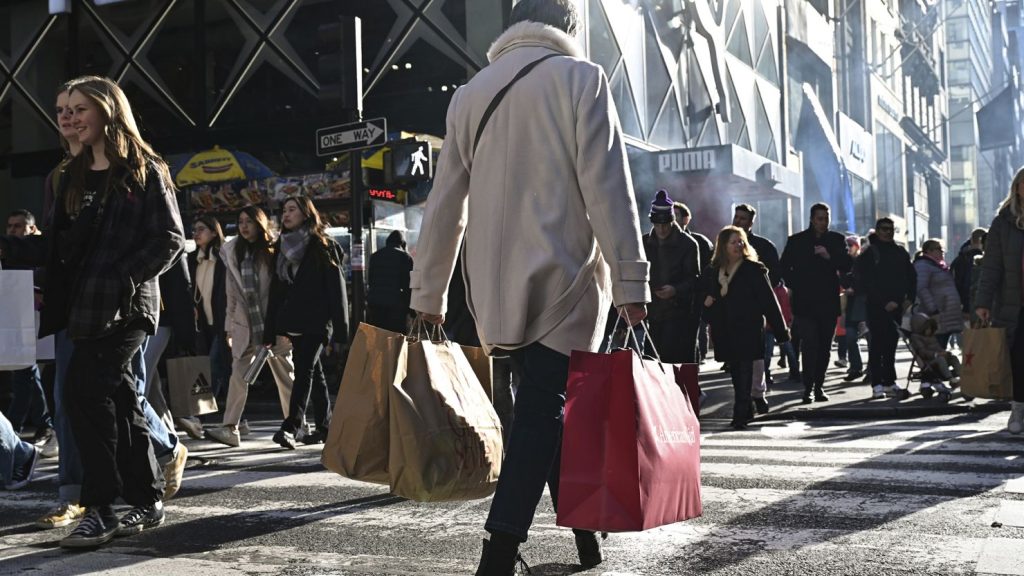
The US economy demonstrated solid growth in the third quarter, expanding at an annual rate of 2.8%. While this marks a slight decline from the previous quarter’s 3% growth, the latest figures from the Commerce Department indicate that the US is poised for one of the strongest economic performances among major economies this year.
Consumer spending emerged as the primary driver of this growth, rebounding from earlier in the year. This economic report comes at a pivotal moment, just days before polls close in a highly contested presidential election where surveys consistently show that the economy is the foremost concern for voters. However, it remains uncertain whether these positive economic figures will alleviate public anxiety.
Since the pandemic, overall economic sentiment has remained gloomy, with a notable 21% increase in prices over the past four years overshadowing even the most encouraging economic data. A recent poll conducted by the Associated Press-NORC Center for Public Affairs Research revealed that a significant 62% of Americans perceive the economy as “bad.” Given the political landscape, where the saying “it’s the economy, stupid” has often been invoked to explain election dynamics, this situation poses a challenge for Kamala Harris and the Democrats, who currently hold the presidency.
Donald Trump has sought to capitalize on these concerns by emphasizing his own economic record during his presidency, a time remembered by many as more favorable. Yet, as political opinions have increasingly become polarized over recent decades, analysts question the extent to which economic factors will influence the election outcome this year.
Marjorie Connelly, a senior fellow at the AP-NORC Center, remarked, “Even though the economy is based on numbers, a lot of people’s views are partisan. The economy will be a factor, but I think partisanship will be the biggest factor.” The poll highlights this division: 61% of Democrats consider the economy to be good, in stark contrast to just 13% of Republicans and 28% of independents.
The poll also revealed a split in voter trust regarding economic issues such as grocery and gas prices or jobs, with preferences differing significantly along party lines. Despite the economy being a primary election issue, other factors may prove more critical in determining voter behavior, according to Connelly. “I don’t know how much people are going to vote on the economy,” she noted. “There are other issues.”
One reason the economy consistently ranks high in voter concerns is that it remains a relatively common ground issue for both Democrats and Republicans. Nevertheless, the underlying data presents a more favorable picture. Fuel prices have decreased, grocery costs are stabilizing, and wages have been rising faster than inflation over the past year, providing relief for many households facing rising living costs.
In September, the Federal Reserve made its first interest rate cut in four years, citing growing confidence that inflation is being brought under control. Additionally, a significant rebound in job growth that month eased the fears of many economic forecasters who have been anticipating a downturn that has yet to materialize.
The Conference Board’s recent report indicates a substantial increase in consumer sentiment for October, driven by enhanced confidence in job availability and a more optimistic outlook regarding future business conditions and income. Worries about an economic recession have also dropped to their lowest levels since the organization began tracking this question in July 2022.
Samuel Tombs, chief US economist at Pantheon Macroeconomics, speculated that the improvement in sentiment could be linked to rising optimism among Republicans, particularly as they feel more assured about Trump’s potential success in the upcoming election. Conversely, Dana Peterson, chief economist for The Conference Board, attributed the positive sentiment to a broader recognition of the economic reality.
“The data are the data,” she stated. “What we’re seeing is that third quarter GDP was strong, the job market is healthy, and inflation is slowing. After several years of volatility, consumers are indicating they believe inflation is less intense, and they are not as worried as before.”
In summary, while the economy shows signs of strength, public sentiment remains divided and complex, with partisan views likely shaping the electoral landscape more than the numbers alone.







